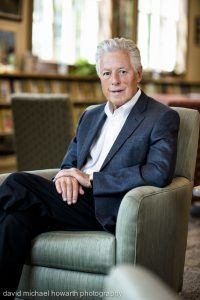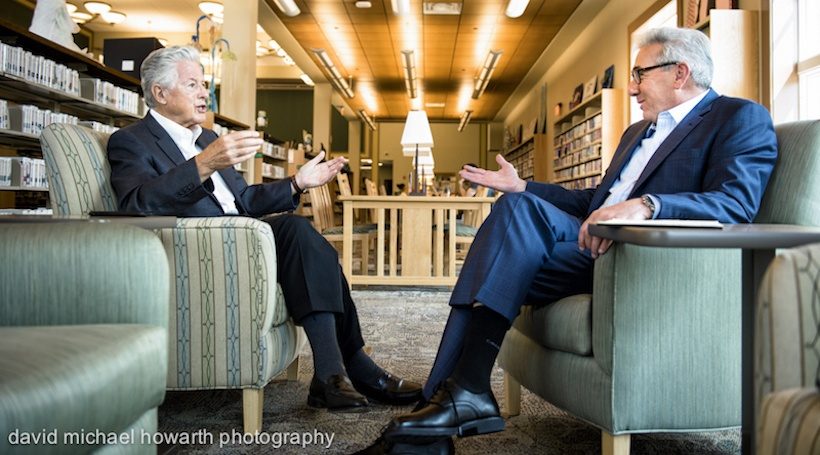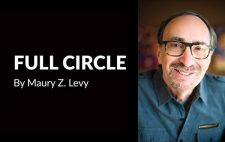Jim Florio has still got it. At 80 years old, Florio still has that pugnacious look and attitude, that shock of hair straight out of 1950s Brooklyn, that hard-core left-wing pragmatism that got him bounced out of Trenton after one term as governor.
We all know the story: South Jersey’s favorite son, congressman from Camden for a generation, finally lands, in 1989, at Drumthwacket, where he ushers in the largest tax increase in state history as a way to put the state’s education system on sound footing. In response, there is a seminal citizen revolt that makes the Tea Party look, well, like a tea party. Raise your hand if you still have a “Dump Florio” bumper sticker on your refrigerator.
But, in case you missed it, Florio has proven to be right – I mean really, really right on many, many issues. The environment, taxes, the pension funds – he was right about all of it.
Earlier this summer, Florio and his wife Lucinda, a former school teacher from Pine Hill, moved back to South Jersey after being away for nearly three decades.
 I have known the Florios since the late 1980s, when I wrote about New Jersey politics for The Philadelphia Inquirer. Indeed, the last time I interviewed him was Election Day eve 1989. I rode with him in the back of his campaign car, around the state that was about to coronate him. He was defiant, righteous and fascinating – intellectually curious and engaged. More professorial than political. Still is.
I have known the Florios since the late 1980s, when I wrote about New Jersey politics for The Philadelphia Inquirer. Indeed, the last time I interviewed him was Election Day eve 1989. I rode with him in the back of his campaign car, around the state that was about to coronate him. He was defiant, righteous and fascinating – intellectually curious and engaged. More professorial than political. Still is.
So I was not surprised in the least when one day in late June, I wandered into Moorestown Library to return some books and there at the circulation desk, getting his library card, was the former governor, dressed in a crisply ironed charcoal-gray suit and white shirt, ignored by the Moorestown moms and their kids.
I invited him back to the library for a conversation we could record for SJ Magazine. And as you will see, he’s still got it – calling out President Trump, offering tough advice for the new governor, even making sure his grandchildren know what really happened back then when he was running the State of New Jersey.
Why did you and your wife, Lucinda, decide to come back?
Well, this is really home. This is where I started my political career. We have a lot of good memories here. But over and above that, our grandchildren live here in South Jersey. That was a major factor.
How many grandchildren do you have?
We have 10. They’re now out of college and getting married. We have eight in South Jersey and two up in New Hampshire. When they were young, they really had no idea what Pop-Pop – that’s me – did. And the most significant thing they were impressed by was when I was in office, we cleaned up the ocean fairly dramatically. We went down and saw humpback whales and dolphins that had come back because of the ocean being cleaner. That was a monumental event of their younger lives.
When you explained to them how your administration was instrumental in cleaning up the ocean, what was their reaction?
They were very impressed. I mean, anybody who can bring back humpback whales and dolphins has got to be deserving of some sort of recognition. I got that recognition from my grandchildren. It was nice.
It was so funny that you and I ran into each other in the library.
The first thing I did was check out the library. It’s cool being a nerd.
What are you reading these days?
Actually I’ve been reading a couple of different books. In light of what’s going on in Washington, I’ve been reading some history. I read a biography of Lenin and a new biography of Hitler. What’s really scary is a lot of the things we’ve seen in the ’30s and the ’40s, we’re starting to get a semblance of things changing, not necessarily for the good.
 How much are you concerned about that?
How much are you concerned about that?
I’m very concerned. I know President Trump personally. I worked with him on a couple of occasions. He’s fundamentally a flawed personality. The good news is he’s not a bigot. He’s not a racist. He’s an unprincipled opportunist. He was sort of a mercurial personality. He didn’t work very well with others. He has an authoritarian streak in him. And it’s all manifesting itself now. So for people who know him, and I’ve talked to a number of people who know him, none of the things he’s done have surprised any of us.
Let’s shift to New Jersey. What advice would you give to the incoming governor?
I haven’t got any advice. The problems are so beyond my comprehension. The pension system is $60 billion short. The healthcare system for state employees is $40 billion short. I don’t know where you go for that type of money. My thought is that other states are starting to have the same problems we are. At some point, we’re going to have to change our whole federal system and have more reliance upon the federal government to raise monies and have revenue sharing back to the states. But that’s not going to happen in the next four years.
You’ve always been interested in Camden. There have been so many projects to try to revitalize the city. How close do you think they are to getting it right?
They’ve turned it around. The changes that are occurring now in Camden are very impressive. And largely as a result of local governance; Mayor Dana Redd is competent and honest. Camden hasn’t had that combination of things for a very long period of time. I’m very optimistic about Camden’s comeback.
You’ve always been interested in energy. Will we ever see wind turbines off the coast of New Jersey?
Yes.
How soon?
Well, we’ve been marking time for six years. The policies of this administration have been totally counterproductive. Seven years ago, a law was passed implementing financing mechanisms for funding off-shore resources of wind terminals, and the administration has been sitting on its hands for six years. A new administration, Democratic or Republican, is going to understand that off-shore wind resources for New Jersey are phenomenal. The private sector is ready to move with a receptive administration. It will happen.
How would you like history to be written about the Florio Administration?
I don’t spend a lot of time thinking about those types of things. I would tell you that as time has gone by, things have gotten much better for me in terms of people recognizing the merits of some of the things we did. Even the tough things we did.
Like what?
I was the last governor to fully fund the pension system. After me, the problems came. People now acknowledge that. We cleaned up the ocean. We did a whole lot of things on insurance. We actually put in place healthcare reforms that the federal government is just getting around to doing. People are starting to understand that everything you do doesn’t immediately resonate as good. It takes some time. Differentiating between short-term interests and long-term interests is, I think, things that leaders have to really aspire to. You can’t have people throwing rose petals in your path all the time. Sometimes you have to make hard decisions.
What’s the one big thing the next governor has to accomplish?
They’ve got to balance the budget. It’s constitutionally required, and we’ve been jerking people around for the last 25 years. Shifting monies out of one pot to another pot. You can do that for just so long and after a while, it starts to catch up with you. It’s caught up with New Jersey.
You have to be willing to tell people the truth even when it’s not pleasant. Unfortunately, there are no pleasant, easy answers now. We have reached the position where you talk about what option is less bad. But it’s absolutely essential if you’re going to have citizens engaged and informed. That’s the key. The only way we’re going to work our way out of these problems is to get citizens to listen hard to all the unpalatable choices, and then pick which option is the least unpalatable.
You sound so pessimistic about the world for your grandchildren.
I’m being realistic, and the optimistic note is people are prepared with the right leadership to become engaged in the process. Engagement is the key to our system. I mean, it’s called participatory democracy. Unless we all work at making the system work, it won’t work.

If you remember, the last time you and I talked one-on-one was in your campaign car on Election Day in 1989. We drove all over South Jersey on Election Day.
Yeah. Well, obviously there was campaign fraud. I never met anyone who voted against me!
People are interesting. People forget why they disliked you. There were times when we had really difficult times in politics. Drivers from out of state would come into New Jersey, see the bumper stickers and think my first name was Dump. People with hindsight understand that you have to make tough decisions.
Was that hard on your family?
My wife had some difficulties. When we banned assault weapons – for which I received the Profile in Courage Award from the Kennedy Library – that was ugly. People were out parading in front of Drumthwacket with pictures of me with swastikas and Hitler mustaches. That was a little overly personal, but I dealt with it. Normal people, my wife particularly, couldn’t easily deal with it. But you have to have thick skin.
Has it been hard for you to go through that process of reconciliation?
Strangely enough, no, because my personality is such that I don’t go with the highs and I don’t go with the lows. I try to keep a fairly steady pace about things.
What project are you working on now?
I just finished writing a book. It’s going to be published early next year. Rutgers University Press is going to publish it. We’re working on the title. I wanted to talk about lessons learned, experiences that helped me. And some of the experiences were negative experiences. I learned as much from the things that went badly as the things that went well. I think that’s a good approach to life.
What was the experience of writing a book like?
It was very informative. I went back and checked on things and many things I was convinced happened, didn’t. So it was a self-monitoring process as well.
Cathartic at all?
Not as much cathartic as it was revealing about patterns I didn’t notice when they were happening. But with hindsight, I do notice.
Why don’t we do a book reading and signing here at the library for the Friends of the Library?
That’s a wonderful idea.
Some unpublished pieces of the conversation between SalPal and Gov. Florio
Why did the Democrats lose in 2016?
It’s a long, complicated story, but people are troubled by the changes that are taking place in our society. The changes are occurring in a way that is not normal — change is not incremental, it’s not marginal; it’s systemic, it’s very transformational. And that type of change is disruptive and very stressful. People are looking for answers, and Donald Trump offered them very specific answers. Build a wall; Mexico will pay for it. Put all the coal miners back to work. Of course, none of those things are going to happen, and people will be that much more disabused and discouraged. But that was the key to his success; he was specific, very plain spoken, easily understood but giving wrong answers.
What happens in 2020? If you were to put together a campaign game plan for the Democrats, what would it be?
Well, it’s a long period of time between now and 2020. Issues can change. Foreign affairs are particularly hazardous at this point. We have to start talking about the things that people are concerned about: peace, jobs, economy. But really, it all depends on who it is you look for as a candidate, and three years is a lifetime in politics. There are people we may not even have heard of who may very well surface.
What happens next with Trump, in your opinion?
The answer is I don’t know. He’s there, absent an impeachment or something of that sort, for a four-year period, and we’re going to have to figure out how to get through it. Hopefully, the Congress will be a little more assertive, even the Republicans in the Congress will be a little more assertive.














